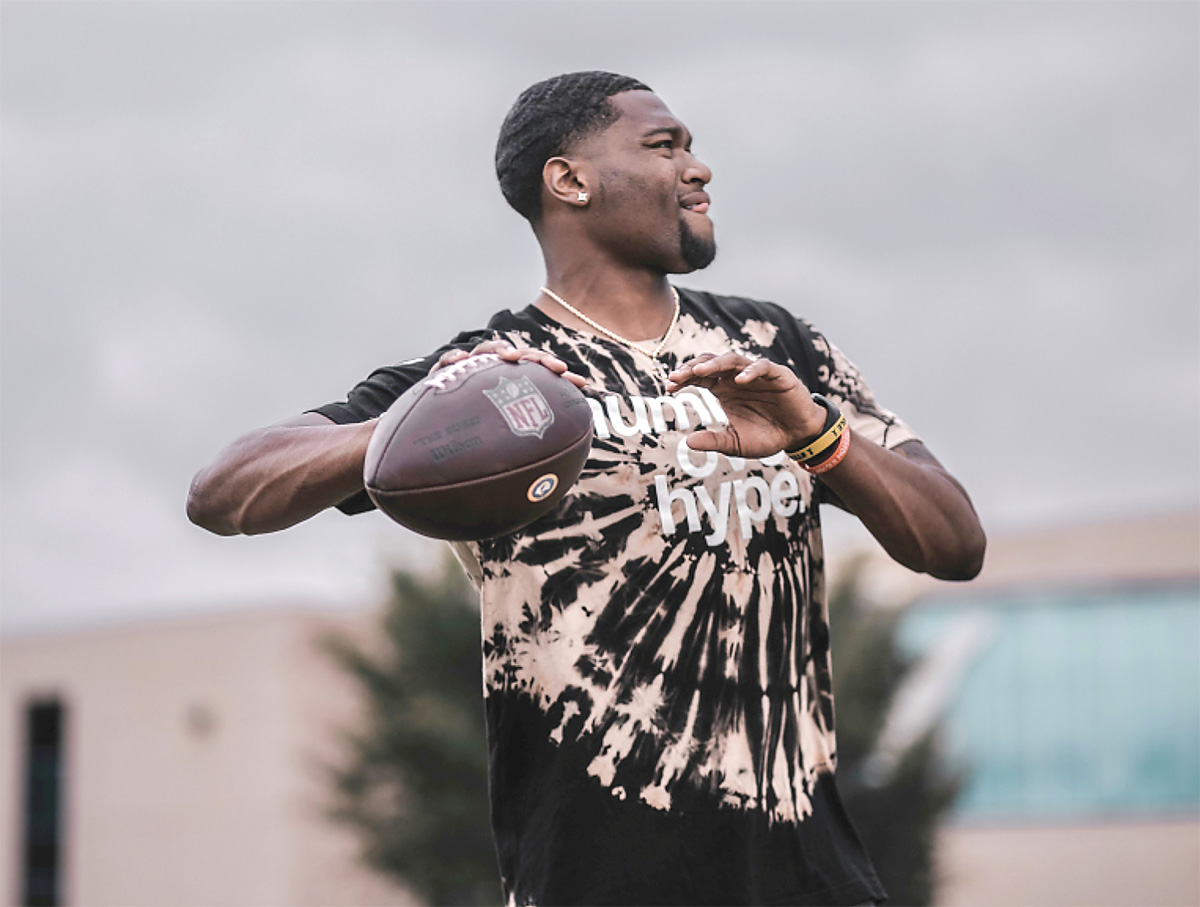Back to Form: Pro QB Game-Ready After Overcoming Rare Condition

As a football quarterback, Montell Cozart was accustomed to calling the signals. But in the summer of 2023, he learned a lesson in listening to the signs his body was sending him.
First, it was a cut on his face. And a sinus infection. Then, a test revealed he had contracted Epstein-Barr, a common virus that causes flu-like symptoms. Individually, none of them was particularly worrisome.
But for Montell, 28, the combination produced something far more serious. Montell is a professional athlete. An Overland Park native, he played football for the University of Kansas Jayhawks, and then spent time in the Canadian Football League. He then returned to the U.S. and joined the Houston Gamblers, a traveling team with the United States Football League (USFL).
Although no stranger to football-related injuries, Montell began experiencing unfamiliar symptoms. It started with a tingling in his hands and feet, and progressed to a weakening of his muscles. He also had trouble swallowing. When his symptoms worsened, Montell consulted with a neurologist. A spinal tap showed that he had developed Guillain-Barré Syndrome (GBS).
GBS is rare, affecting only about 5,000 people annually nationwide, but is potentially a very serious condition, causing the body’s immune system to become “confused” and turn against itself. Rather than attacking germs, the immune system targets the peripheral nerve system instead, damaging the nerves so that they are unable to properly transmit signals to the brain.
It’s not known exactly why some people develop GBS, although evidence suggests exposure to certain viruses, such as Epstein-Barr, will trigger its onset. The condition is also more prevalent in men.
The initial symptoms, as in Montell’s case, usually appear relatively sudden, over a period of several days or weeks. In some cases, they are even more rapid, presenting within hours. GBS can be difficult to diagnose because symptoms mimic those of other conditions; however, they typically include a tingling sensation and muscle weakness, and some people experience considerable pain. As the disease progresses, it can cause a loss of muscle strength and coordination, and patients can lose sensation in their
arms and legs. In severe cases, or if left untreated, it can cause permanent nerve damage, paralysis, lung and heart problems, and, in some cases, death.
"It was scary when I was diagnosed and they told me how serious it can get,” said Montell. “I didn’t know what was going on. But I had family and friends praying for me, and I knew God was looking after me.”
GBS is not curable, but it is treatable. Medical treatments include blood plasma replacement, which removes harmful antibodies, and immunoglobulin therapy, which introduces healthy antibodies and dilutes the harmful ones.
After spending a week in the hospital to treat his condition, Montell transferred to Saint Luke’s Rehabilitation Institute and spent a month undergoing physical, occupational, and speech therapy to regain his strength, mobility, and balance.
When he began treatment at the Rehabilitation Institute, Montell was in a wheelchair. He weighed 180 pounds, almost 30 pounds under his ideal playing weight. Getting on the football field again seemed a long way off. The most basic tasks, such as bathing and brushing his teeth—even swallowing—would have to be re-learned. But Montell was ready to do the work.
His therapists designed a therapy program that included agility and coordination movements related to football, and Montell soon showed progress. Under the direction of Venessa Lee, MD, a specialist in physical medicine and rehabilitation, the Saint Luke’s team coached him through each step. He began using a walker, and then started walking on his own.
"My care team was awesome, from my physical therapist and occupational therapist, to all the others who stepped in. Everyone was really good,” he said. “I’m a testimony that rehab, and being dedicated to going in every day, can make a huge difference.
"Sometimes I would sit down, and sometimes I would break down, but it’s important to just trust the process and know that the doctors around you have your best interests in mind.”
After being discharged at the end of August, Montell has regained the weight he lost, and worked his way back to game shape with regular workouts. Montell re-signed with the Houston Gamblers in September. He now has the goal of donning his No. 6 jersey and being ready to attend training camp.
Because GBS is rare, it does not get the attention that more common diseases receive. Montell hopes to change that, using his football career as a platform to spread awareness of the condition.
"The whole process has been eye-opening,” said Montell, “and rewarding as well.”
Recent News
Patient Stories
Finding Her Voice: The Children’s SPOT Helps Young Girl Turn Silence Into Strength
Patient Stories
From Fragile Beginnings: How The Children’s SPOT Helped a NICU Baby Thrive
Patient Stories
Roadside Heroics Lead One Grandfather to Lifesaving Care at Saint Luke’s Mid America Heart Institute
Patient Stories
A Team Effort Brings Patient Back to Life at Saint Luke’s Mid America Heart Institute
Patient Stories
Nina Offers a Helping Paw to Saint Luke’s Cancer Patients
Patient Stories